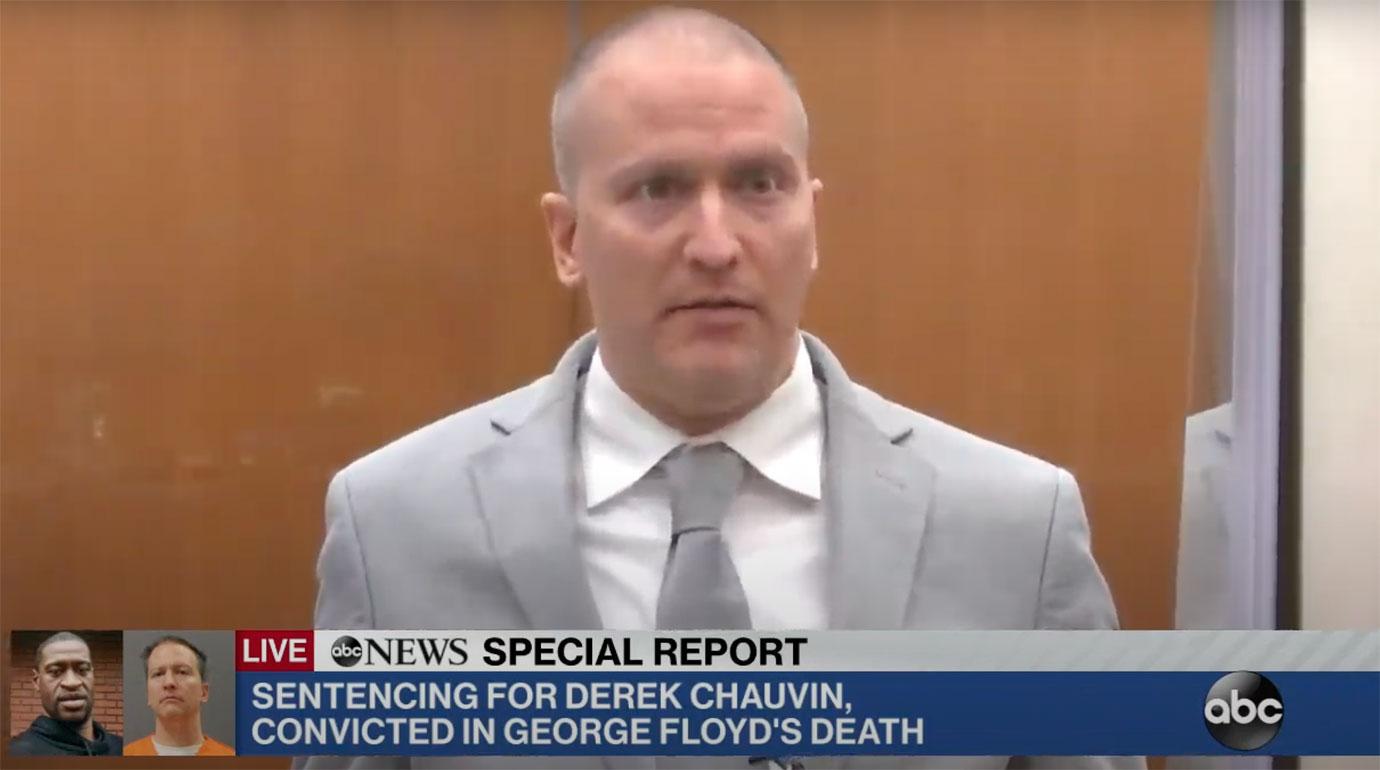Officer Derek Chauvin Sentenced To 22.5 Years In Prison For Death Of George Floyd
Derek Chauvin, the former police officer who killed George Floyd on a Minneapolis street last year, was sentenced on Friday, June 25, to 22-and-a-half years in prison.
Since he had no prior criminal record, under Minnesota law, Chauvin will have to serve two-thirds of his sentence, or 15 years — and he will be eligible for supervised release for the remaining seven-and-a-half years.

Floyd family attorney Ben Crump, in a statement, said the "historic sentence" brings the family and nation "one step closer to healing by delivering closure and accountability."
"With Chauvin's sentence, we take a significant step forward — something that was unimaginable a very short time ago," he said.
Before the sentencing, Chauvin, who was facing up to 40 years behind bars, addressed the court briefly and offered his "condolences to the Floyd family."
"There's going to be some other information in the future that would be of interest and I hope things will give you some peace of mind," he added.
The day before, Hennepin County District Court Judge Peter Cahill denied Chauvin's post-verdict motion for a new trial. In a ruling filed Thursday evening Cahill said the "Defendant has failed to demonstrate that the Court abused its discretion or committed error such that Defendant was deprived of his constitutional right to a fair trial."
Cahill also said the Defendant failed to demonstrate the State engaged in prosecutorial misconduct or a case for juror misconduct.
The request for a new trial is different than an appeal in that it is addressed to the trial judge. Chauvin will have 90 days from the imposition of his sentence to file an appeal with the Minnesota Court of Appeals.

- Federal Grand Jury Rules On Four Former Minneapolis Police Officers In George Floyd's Death
- Derek Chauvin Pleads Guilty To Violating George Floyd's Civil Rights Case, Prosecutors Requesting 25 Years In Prison
- Derek Chauvin Mugshot Released — What's Next For Ex-Cop Convicted Of Murder In Death Of George Floyd?
Want OK! each day? Sign up here!
Back in April, the 45-year-old was found guilty on all three charges — second-degree unintentional murder, third-degree murder and second-degree manslaughter — in the death of Floyd.
Chauvin was arrested on May 29, 2020, and initially charged with third-degree murder and second-degree manslaughter, making him the first white American police officer in Minnesota to be charged in the death of an African-American civilian.
On May 25, 2020, Floyd, a 46-year-old Black man, was killed in Minneapolis while being arrested on suspicion of using a counterfeit bill. During the arrest, Chauvin, a white police officer with the Minneapolis Police Department, knelt on Floyd's neck for nine minutes and 29 seconds after he was handcuffed and lying face down.
Two police officers, J. Alexander Kueng and Thomas Lane, assisted Chauvin in restraining Floyd, while another officer, Tou Thao, prevented bystanders from interfering with the arrest and intervening as events unfolded.
WINSTON MARSHALL QUITS MUMFORD & SONS TO SPEAK FREELY AFTER FACING BACKLASH FOR PRAISING RIGHT-WING RABBLE-ROUSER
Floyd had complained about being unable to breathe prior to being on the ground, but after being restrained he became more distressed and continued to complain about breathing difficulties, the knee on his neck and expressed the fear he was about to die.
After several minutes passed, Floyd stopped speaking. For a further two minutes, he lay motionless, and officer Kueng found no pulse when urged to check. Despite this, Chauvin refused pleas to lift his knee until medics told him to.
The following day, after videos made by witnesses and security cameras became public, all four officers were dismissed. Two autopsies found Floyd's death to be a homicide. His death has since spawned worldwide protests against police brutality, police racism and lack of police accountability.
Kueng, Lane and Thao are charged with aiding and abetting second-degree murder. Their trial is scheduled for 2022.
On March 12, Minneapolis agreed to pay $27 million to settle a wrongful death lawsuit brought by Floyd's family.

